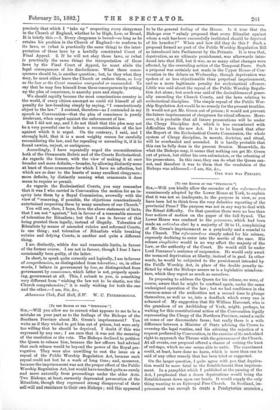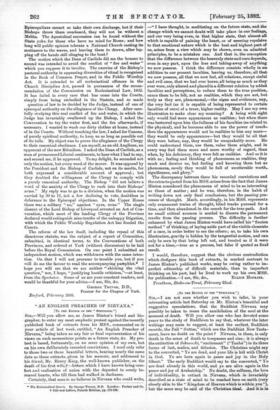(TO THE EDITOR OP THE " SPECTATOR.1
SIR,—Will you kindly allow the seconder of the refo•mandum unanimously adopted by the Lower House at York, to explain that it was not so inadequate, to the purpose in view, as you
have been led to think from the very defective reporting of the provincial Press ? The purpose was not in any way to deal with the Ritual difficulty. On that question there were no less than four notices of motion on the paper of the full Synod. The Lower House was confined to the gravamen, which had been made an articulus deri by a majority of 38 to 11, complaining of Mr. Green's imprisonment as a perplexity and a scandal to the Church. The reformandunt simply asked for his release, expressly declining to enter into the merits of the case. His release simpliciter would in no way affect the majesty of the Law, or the authority of the Court. He would still be under Lord Penzance's sentence of suspension. He would only await the menaced deprivation at liberty, instead of in gaol. In other words, he would be subjected to the punishment intended by the Public Worship Act, in place of the double penalty in- flicted by what the Bishops assure us is a legislative misadven- ture, which they regret as much as ourselves.
In proposing to address the Queen for his release, we were, of course, aware that he might be confined again, under the same undesigned operation of the law ; but we had confidence in the common-sense of the authorities not a second time to plunge themselves, as well as us, into a deadlock which every one is ashamed of. My suggestion that Sir William Harcourt, who is the grandson of an Archbishop of York, might, perhaps, be waiting for this constitutional action of the Convocation legally representing the Clergy of the Northern Province, raised a smile on some of our disconsolate faces ; but really there is a wide difference between a Minister of State advising the Crown to overstep the legal routine, and his advising the rejection of a request preferred by Convocation, in the exercise of its undoubted right to approach the Throne with the grievances of the Church. At all events, our proposal offered a chance of cutting the knot of red-tape, which no one seems able to untie. The experiment could, at least, have done no harm, which is more than can be said of any other remedy that has been tried or suggested.
On the larger question, I quite agree with you that depriva- tion would be more fatal to the Establishment than imprison- ment. In a pamphlet which I published at the passing of the Act, I prophesied that a dozen deprivations would bring the Establishment down upon our heads. It would supply the only
thing wanting to an Episcopal Free Church. In Scotland, im- prisonment was enough to create a Presbyterian secession ;
Episcopalians cannot so take their own discharge, but if their Bishops throw them overboard, they will not be without a Melita. The Apostolical succession can be found without the State yoke, for those who have no mind for Rome ; and how long will public opinion tolerate a National Church casting its mutineers to the waves, and leaving them to drown, after lop- ping off the hands still clinging to the boat P
The motion which the Dean of Carlisle did me the honour to second was intended to avoid the conflict of " fire and water" which you suppose it to involve. The exercise of the Bishop's pastoral authority in appeasing diversities of ritual is recognised in the Book of Common Prayer, and in the Public Worship Act. It is extended to all ecclesiastical offences in the Church Discipline Act, passed in pursuance of the recom- mendation of the Commission on Ecclesiastical Law, 1832. It has failed in every case that has come into the Courts, simply from being embodied in the Statute, and so made question of law to be decided by the Judge, instead of one of episcopal authority on the allegiance of the Clergy. After care- fully studying this real conflict of fire and water, in which the Judge has invariably swallowed up the Bishop, I asked the Convocation to try the water first, and the fire afterwards, if necessary. I wanted to wash our dirty clothes at home, instead of in the Courts. Without touching the law, I asked for Canons, of purely spiritual authority, to keep us as long as possible out of its toils. My object was to prove the allegiance of the Clergy to their canonical obedience. I am myself, as an old Anglican, an opponent of the new Ritualism. I asked the Dean of Carlisle, as a man of pronounced Liberal sentiments, to hear what I had to say, and second me, if he approved. To my delight, he seconded not only the motion, but every word of the mover. It was opposed by the President and the Bishop of Carlisle, not on its merits, for both expressed a considerable amount of approval ; but they doubted the willingness of the Clergy to comply with a purely canonical authority. The Bishop " did not believe a word of the anxiety of the Clergy to rush into their Bishops' arms." My reply was to go to a division, when the motion was carried by 30 to 11, not a few declining to vote, doubtless in deference to the Episcopal objections. In the Upper House there was a solitary " no," against " ayes, none." The single dissent of the Lord Bishop of Liverpool arrested an Act of Con- vocation, which most of the leading Clergy of the Province declared would extinguish nine-tenths of the unhappy litigation, with which the Public Worship Regulation Act has flooded the Courts.
The reform of the law itself, including the repeal of this disastrous statute, was the subject of a report of Committee, submitted, in identical terms, to the Convocations of both Provinces, and ordered at York (without discussion) to be laid before the Royal Commission. On one point I submitted an independent motion, which was withdrawn with the same inten- tion. On that I will not presume to trouble you, bat if you will do me the favour to read the accompanying pamphlet.* I hope you will see that we are neither " shirking the vital question," nor, I hope, "justifying hostile criticism,"—at least, from the Spectator. Some of us are your constant readers, and would be thankful for your advice.—I am, Sir, &c.
GEORGE TREVOR, D.D.,
Beeford, February 20th. Proctor for the Chapter of York.



































 Previous page
Previous page